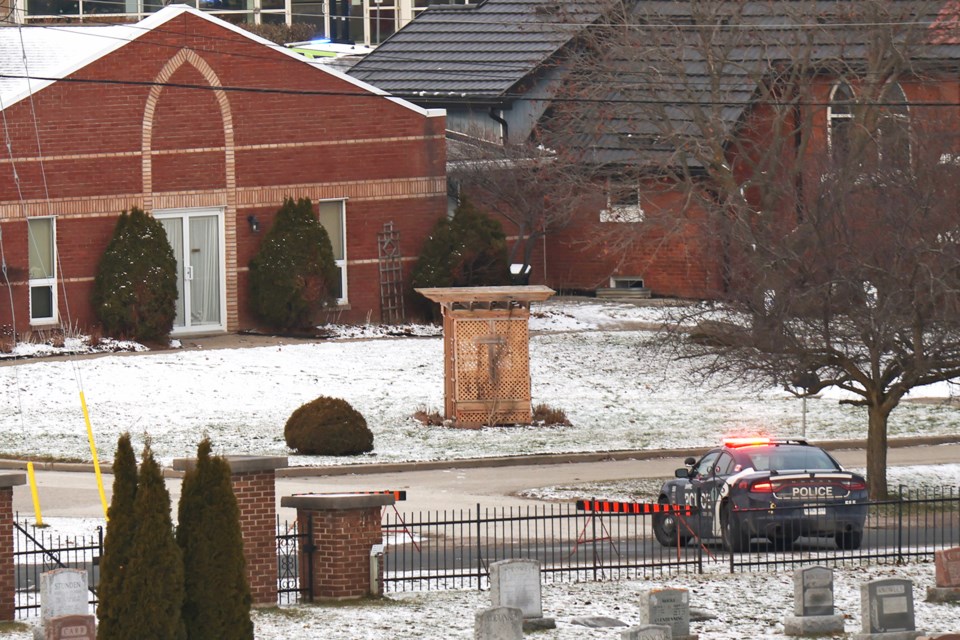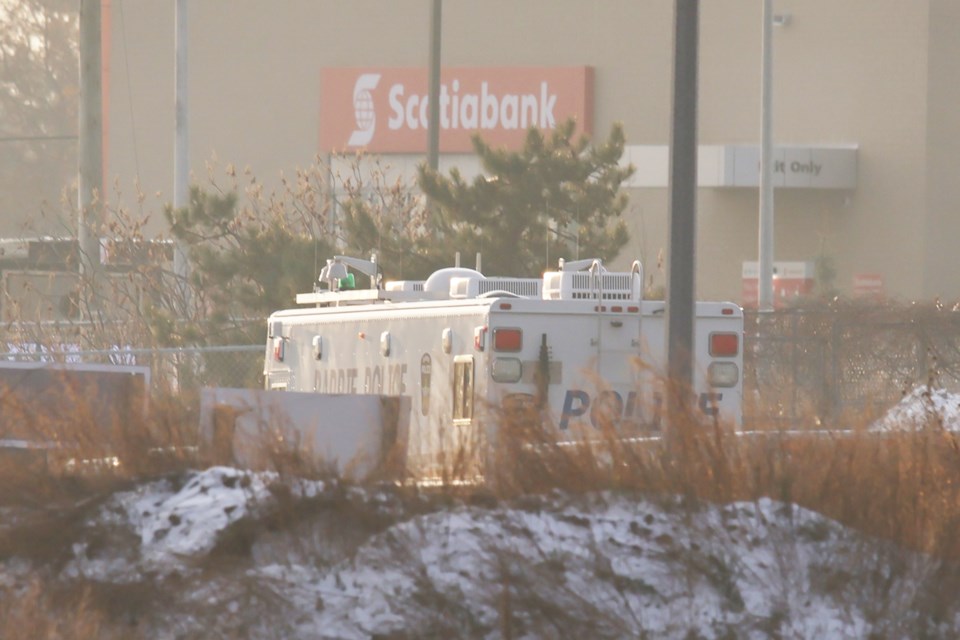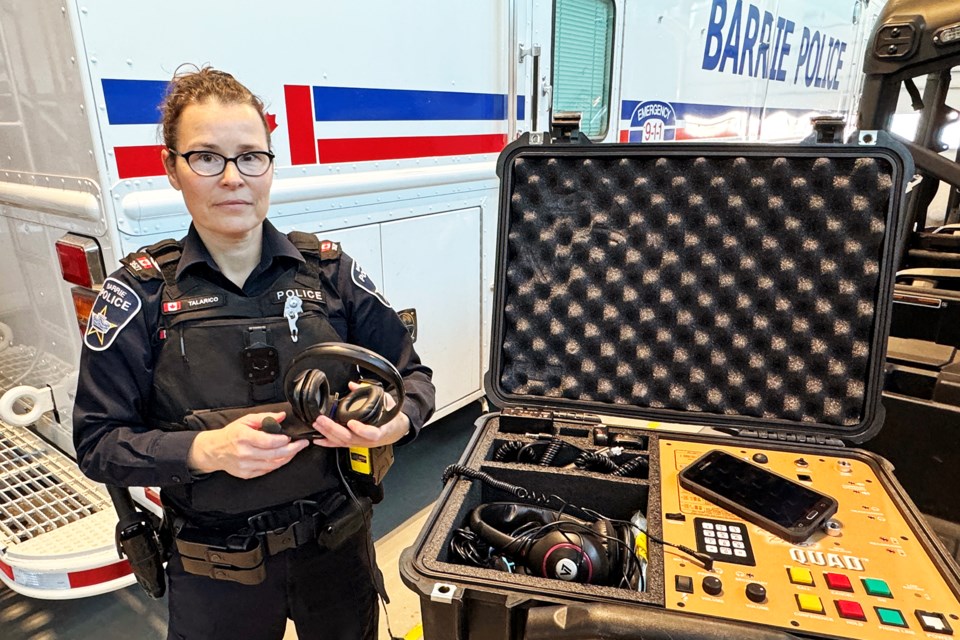On-scene police negotiators worked around the clock to end a nearly 24-hour standoff involving a “person in crisis” recently in the area of Mapleview Drive East and Yonge Street in south-end Barrie.
The tense situation began around 5 p.m. on Monday, Dec. 11 and it took until mid-afternoon the next day to resolve the situation, when the man peacefully surrendered.
Police say highly trained negotiators from Barrie and Peel Region worked together seamlessly to end the standoff with the 47-year-old Barrie man.
No further information has been released about the man or whether he was armed. Police have also not said whether he has been charged with any crimes.
No injuries have been reported in connection to the situation and police said the man was transported to a local hospital.

Barrie police Sgt. Toni Talarico, a crisis negotiator who took part in successfully de-escalating the scene that day, sat down with BradfordToday and InnisfilToday at Barrie police headquarters to talk about her experience and the work that goes into crisis negotiating.
Talarico, who has been a police officer for 26 years, joined the crisis negotiator team in March 2016. There are currently eight officers on the team within the Barrie Police Service.
“I was very thankful that our team in Barrie was able to go out that day and help someone in crisis who needed help,” Talarico said.
She said it’s always a good feeling when someone trains for something and has an opportunity to put that training into action, which leads to a successful and peaceful outcome.
“I was very thankful and appreciative of my team of negotiators — my team that involved the incident commander, the tactical support unit, the front-line officers who were facilitating the containment that day. We all came together and worked well and had a successful outcome to a very lengthy and prolonged and stressful negotiation,” Talarico said.
She was on scene working for 16 hours that day.
“With lengthy and prolonged negotiations, you are tired and exhausted,” she said.
The time of year also came into play — it was cold.
“By hour 12 and 13, it’s important to have relief,” added Talarico. “There were three main negotiators that night and we supported each other. We took turns and we gave each other needed breaks so we could warm up, grab some water and then refresh a little bit, to step in when we needed to step back in again.”
Crisis negotiation is more about listening to the person who is having the crisis, understanding their emotions, what’s going on for them and hopefully being a support for them to get through whatever they’re going through, she explained.
“So, it’s more about listening to what they need — just to be a listener for them and to support them,” said Talarico. “And then it’s about working as a team with that subject to come up with better solutions to their crisis.”
Crisis negotiation is also more about emotion than it is about whatever physical act may have brought them there, she added.
“It’s more about understanding what’s going on with them as a person and helping them rationalize the situation to make the best and most positive outcome for them, and for the public. It’s very humane; it’s very much emotionally driven,” she said.
“The best crisis negotiators are those who can listen well and understand emotion, and be able to talk to a person without judgment, because crisis negotiators are there for the person, not for anything else.”
She stressed their main focus when they are in negotiations is the person and what they need, and what will help them make the better and more positive choice.
When requested, and depending on the situation, members of the crisis negotiator unit go straight to the scene, where talks might be already ongoing, or they may come into the station and have a bit of time to conduct a briefing before they put a plan in action.
“There’s quite a few different types of calls that crisis negotiators will get called to. First and foremost, all front-line police officers are quite capable in negotiating through a crisis — they do it daily,” Talarico said.
“But the crisis negotiation team has a little extra training and we get reserved for any prolonged incidents, or any incidents that are a little more high risk in nature.”

Some examples could be if a hostage is involved; a negotiator will get called out for that scenario.
Also, if there is a lengthy call where somebody might be in crisis and suicidal, and it goes above and beyond a call front-line officers can handle, negotiators will be brought in. For example, somebody who is on a bridge or at a high elevation and is considering jumping.
“Crisis negotiators will get called in for that if the front line has time and the capability to wait for us. We will also negotiate when a crime is occurring and the subject might be barricaded but wants to escape and we have them contained,” Talarico said.
“They may not be suicidal, there may not be a mental-health aspect to that call, but more of a criminal nature where an accused is hoping to escape, and we can speak with that subject and hopefully come to a term of a peaceful surrender.”
De-escalation is the primary role of the negotiator, to communicate to the person who is in crisis and hopefully lower their emotions to a level where they can think more rationally.
The tools they use are critically important to supply and maintain communication.
“We have a negotiator phone kit,” she said. “It is a little archaic, but it does the job.”
The briefcase-like system works through Bluetooth and a cellphone. It’s a piece of equipment that allows two negotiators to listen in to the subject who is on the phone at the same time and it also records the conversation.
“We also have a throw phone, which is an old-style phone that’s protected in a plastic container,” said Talarico. “It’s attached to a cable and we can use that to speak to the subject if their cellphone dies, or if they don’t have a phone and we have means to get them that phone.”
Negotiators also work closely with the tactical support unit.
“So, if there is a situation where we want to use the throw phone, typically, we would have our tactical support officers safely deliver the phone,” she said. “We can also use a robot to deliver this phone and then we have a means to communicate with the subject.”
Sometimes, the biggest enemy of a negotiator is stress.
“During the call itself, I think I go into work mode and my training kicks in,” Talarico said. “I don’t allow the stress to get to me. I know I have a job to do and that’s to lower someone else’s stress. And I know that I have to control my own emotions and my own stressors during the call to be successful, or to at least increase the possibility of success the best way I can.”
Like any other high-risk call police officers go to, it can hit home a little later in the day or when the adrenalin subsides and they realize what they’ve just gone through.
“It can be stressful, and at those moments, it’s reaching out to colleagues, it’s reaching out to family, it’s them reaching out to me that helps get through those moments. And I think knowing that I can only do the best that I can do, whatever kind of negotiation I’m doing, helps as well,” she said.
“Even if it’s not a successful outcome, I know myself that I’ve done my job to the best of my ability, and that helps me deal with whatever the outcome was in the following days.”
